
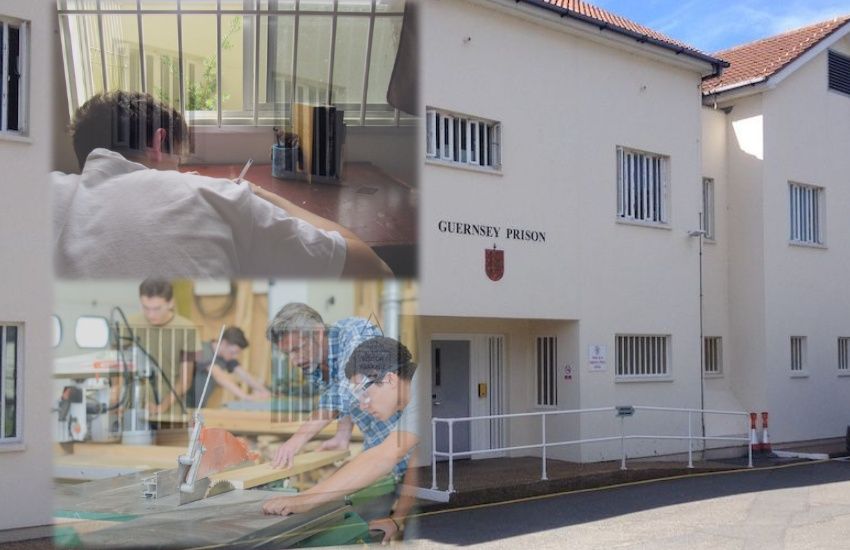

A former inmate who turned his life around after a 10-year sentence for importing drugs into Guernsey has explained why he thinks prison works for some people and not others and what he thinks could be done to improve rehabilitation rates further.
Adam Pagett served a total of three years in Les Nicolles. While there, he grasped opportunities for training and education before being released on licence. He credits Guernsey's prison with saving his life.
Since then, he has qualified as a social worker and now works with homeless people, particularly those with learning difficulties.
He is married with two stepchildren and four grandchildren.
Mr Pagett told Express about his life now and then. You can read our interview with him HERE.
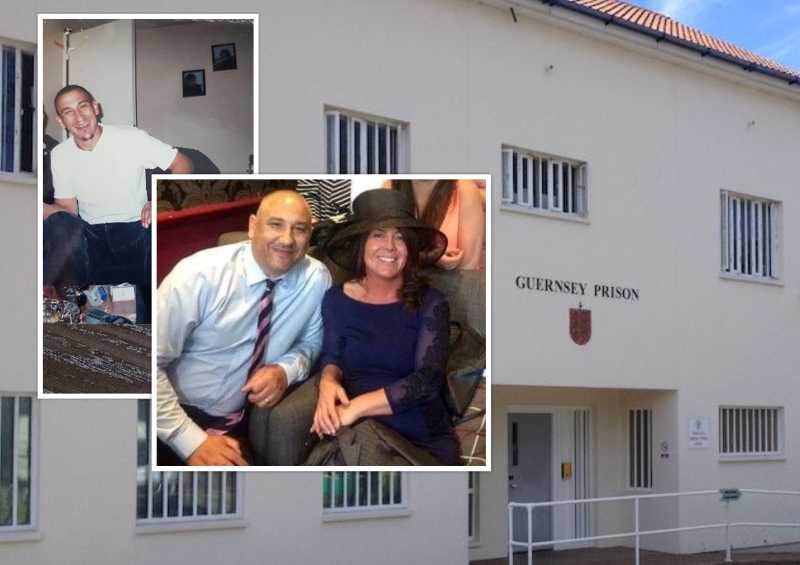
Mr Pagett regularly speaks about how his life has changed radically since being arrested and imprisoned in Guernsey.
"Nobody can force you, but with me I wanted to address my drug use, and I wanted out," he said.
"I wanted out at the first opportunity. To use [drugs] inside - I could have done, but if I’d been caught straight away, you’re not going to get your first parole. I had a year to go before I was even sentenced and they were talking about 21 years because of the amount of drugs that involved and so that motivated me as well."
Having credited prison with saving his life and allowing him to turn it around, Mr Pagett said he has ideas on how prison can help even more people who are facing such troubles. He accepts that individuals need to want to help themselves, as he did when he was arrested in 2005.
"It was an age thing where I'd just had enough. When I got arrested, it was a relief.
"Inwardly, I was relieved because it was the end of my crazy life. It was a positive. I might not have seen it at the time, but with the treatment that I got and everything. If I'd gone to prison for six months, it would have been an inconvenience and that’s it. I'd have still been psychologically addicted.
"I'd tried stopping taking crack cocaine and heroin more than one time in those 15 years. It wasn’t my first rodeo, so to go to prison [I thought] it was up to me how this plays out now. The support is there and I can access it. I don’t have to worry about where I'm going to live next or being able to attend that appointment because something's happened. It was an enforced abstinence and it worked.
"Your past doesn’t have to be what defines you, but it can be what shapes you."
Pictured: Adam Pagett was arrested at Guernsey Airport. He now thinks that moment marked the end of a crazy period in his life and that it was a "relief".
Express spoke to the States about reoffending rates, including Geraldine Martin, Chief Probation Officer at the island's Probation Service. She said that statistics on reoffending rates in Guernsey paint a positive picture.
"The reconviction rates for offenders when sentenced to community sentences and prison sentences in the Bailiwick compares extremely favourably with comparator figures from England and Wales," said Ms Martin.
Figures from 2011 showed that 24% of adults sentenced to community service reoffended within two years, as did 26% of those sentenced to community supervision. Meanwhile, 37% of adults sentenced to prison without post-custodial supervision reoffended within two years, as did 21% of those sent to prison with post-custodial supervision.
In the decade since, reoffending rates have generally decreased. In 2020, the rates of reoffending within two years are as follows: 17% for those sentenced to community service; 20% for those given community supervision; 17.5% after prison sentences without post-custodial supervision and 26% after prison sentences with post-custodial supervision.
Mr Pagett talked to Express about reoffending rates for those released from Les Nicolles.
He agrees that the the statistics look positive and said the island enjoys reasonable success with the successful rehabilitation of prisoners.
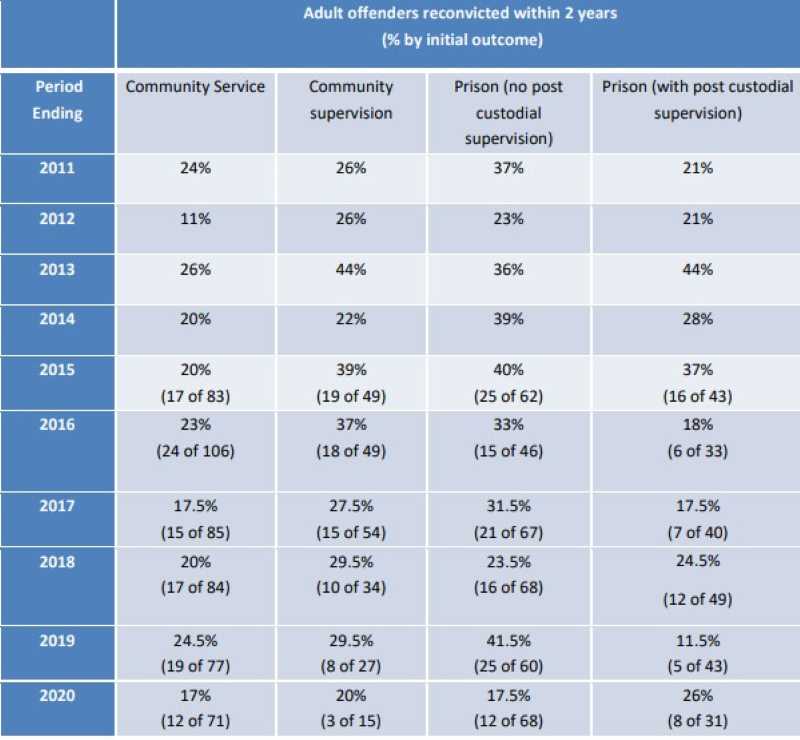
Pictured: Guernsey's Les Nicolles Prison provided Express with the above statistics showing reoffending rates over the last decade.
"I noticed from the figures about the post-prison supervision - I think that is really important. It was for me," said Mr Pagett.
"It was my criminal justice worker that got me books for college and supported me and got me my volunteering position and told me about the opportunity to volunteer for the homeless charity. That had a thing called ‘working in sustainable employment' and they did a course on how to be a support worker.
"I had that lived experience. Normally, you did volunteering for a year and you had a chance of a paid traineeship after. I started in the July and we bypassed that and they offered me a paid contract.
"You got rewarded [in prison] for the motivation and effort but there's also that encouragement - that one to one support - that’s the thing with Guernsey. I always think about what they [prisoners] come out to. If there's nothing there – like Maslow's Hierarchy of Needs - it's like building something on sand.
"If that safe, secure accommodation isn’t there, you're going to achieve nothing. It's temporary. People need that security and stability. They need something they can see. That’s why I started doing talks. I feel it's so important to speak to people and say 'I did this and you can do this'. Or I just think they're being given platitudes and pipe dreams."
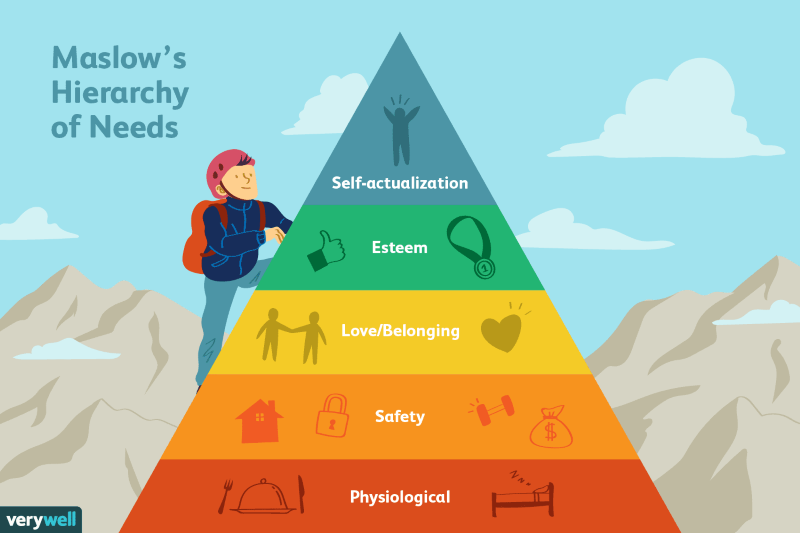
While Mr Pagett turned his life around following his arrest for drug importation, and now regularly talks about his experiences to try and help others, some people struggle to use similar experiences to turn their lives around and go on to commit further offences and are sometimes returned to prison.
He told Express that one of his ideas would be to get rid of the word 'prison' and relabel places like Les Nicolles as 'academies'. He thinks this would encourage inmates to use their time inside for educational and rehabilitation purposes so they can 'graduate', not be 'released'.
Mr Pagett recognises that not everyone leaves prison with the same mindset he did. He has some thoughts on why that might be.
"The way I see the problem with Guernsey is...it’s a very tight-knit community. It's not like getting released from prison in England and you can go to a town where nobody knows you and nobody knows what you’ve done. Your name sticks in Guernsey - so I think people need to make that decision to give up crime.
"If you're known for being a burglar, you'll always keep getting picked up for burglary. Like Henderson, he’s on a hiding to nothing. He's never going to commit the ultimate crime. His life is just a revolving door from prison back to the community that now probably won't accept him as a changed person because mud does stick and it's entrenched.
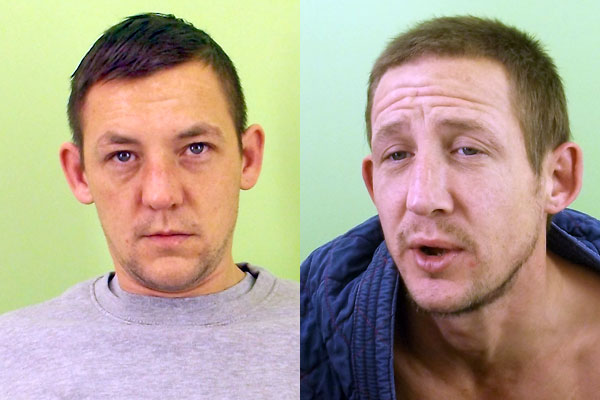
Pictured: Mr Pagett referenced 'Henderson' during his interview with Express. Brothers Kyle (l) and Darren (r) Henderson are currently in prison having committed separate offences, after being released from prison for a previous robbery they had committed together.
"I think that’s why the offending rate is low. People are more supported as well and there's more family and friends, as it's very close knit. In England, you can be released from prison and you’re in a halfway house or dumped in a bed sit - you’ve got no money, no support network, your family could live miles away.
"I think that helps and works in Guernsey's favour. Also in Guernsey prison, it's very person-centric. Either they mean it to or not, but I know now from social work it actually helps. Officers would come and chat to you in your cell one to one.
"They're not prison officers like in England where there's one officer to 100 inmates. They have time to stand and talk and they treat you with respect.
"The last photo I have with my mum is one the prison officers took. They let her stay behind when everybody left and let her stay and talk to me and they took pictures, so I've got photos. Things like that - small gestures that mean so much to a person. When I was just a prisoner, they didn’t need to do any of that. That is part of the reoffending - how people are treated.
"I am a campaigner now and quite vocal about prisons,
"They shouldn’t be labelled prisons. They should be labelled academies because you shouldn’t be released - [you] should graduate.
"If you're there for three years, why can't you teach that person a trade? There's a skills shortage even in Guernsey so teach them a trade because if people are coming out to nothing they're going to have more risk of offending. They're going to be sleeping on sofas, with that negative social network.
"When you get some responsibility, you’ll either survive and thrive or you won't, but with more chances you're going to survive and thrive.
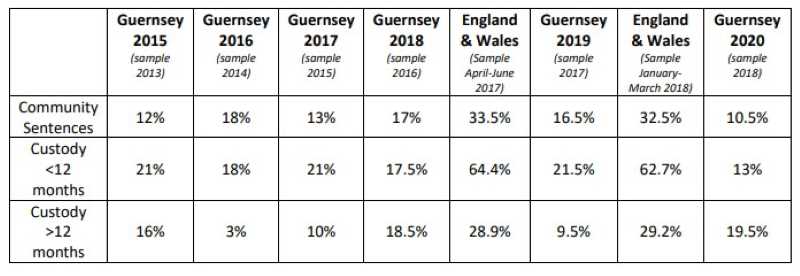
Pictured: Data provided by the States compare the reoffending rates in Guernsey with those in England and Wales.
"Timpsons can’t be wrong. They employ people who leave prison and they have a chain of shoe shops. You’ve got to invest in people [or] you're locking them up for three years and then releasing them to nothing. Prison is the only place where you can come out lower on the social mobility scale than when you went in. You’ve got more doors shut to you.
"We've got to rethink what we mean by rehabilitation because at the moment as a word it doesn’t carry any weight.
"I do think it's about what precedes prison, how their life is and what happens after. 17 and 18 year olds, what hope have they got of getting good housing? If you put somebody in a room with a knackered old set of drawers and burns in the lino you're saying how much they're worth. That’s their worth. You cant even run to a decorated room.
"I think when people feel like that, that sense of low self esteem, that’s when they fall prey to people or form allegiances with people who have a criminal element.
"Someone like Henderson, if he's serving three years and he was actually taught something, give him a fighting chance to come out to. If he had a trade that could give him the means to find a flat...he needs a fighting chance."
Pictured top: Former inmate Adam Pagett has wondered if Les Nicolles could be treated like an academy from which to graduate rather than a prison from which to be released and thinks this could aid the successful reintegration of prisoners into the community once they have served their sentence.
Comments
Comments on this story express the views of the commentator only, not Bailiwick Publishing. We are unable to guarantee the accuracy of any of those comments.